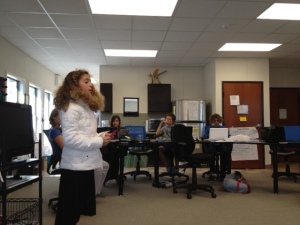“Power corrupts” is the phrase often associated with Lord Acton. But what Lord Acton actually wrote was: “Power tends to corrupt; absolute power corrupts absolutely.”
There’s a big difference between the first quote and the second – the words “tends to” and “absolute” and “absolutely.” Our Acton Eagles understand the difference, because they actively lead their own community.
Yesterday we elected a new Council, in accordance with the governing principles drafted by the Eagles.
Under the terms of the governing constitution, three members are elected; each Eagle has three votes to cast; there must be at least one male and one female on the Council; term limits are enforced and no member can serve a second term until every Eagle has a chance to serve at least once.
Before the vote, a discussion. Which is most important when electing a leader: character, skill or charisma? What criteria will you use to evaluate candidates? Should the quality of the campaign speeches count a little or a lot?
Six nominations; six speeches; 42 votes. Each candidate had read chapter 17 of Machiavelli’s The Prince, and would address in his or her speech whether it was better as a leader to be loved or feared.
Pictures from three of the speeches below.
The new Council members each were elected by a one vote margin. In other words, we had no shortage of leadership material.
Next came the post election discussion. Did you use logic in casting your vote? Emotion? Intuition? Did you stick to your criteria or abandon them?
We celebrated the outgoing Council members, who will be passing along a notebook of “lessons learned” to the new council , a form of institutional memory, our own version of The Prince, a voice of experience to help in difficult times.
Then, a rich discussion about power, and why absolute power “tends to corrupt.” What advice would you give to someone who wants to be a servant leader in politics?
If only some of our grown up politicians could have been there to hear their advice.
A group of self governing ten, eleven and twelve year olds. In charge of their own learning. Establishing their own rule of law and civil society. Profiting from mistakes.
As a society, we expect far too little from young adults. They are capable of great things, and these small lessons of daily life and community are going to serve them well when the stakes are far larger.


